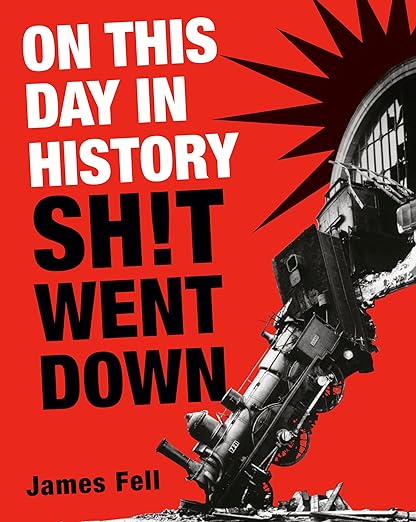When it comes to our past, there’s history, and then there’s James Fell history. James isn’t your run-of-the-mill historian. Known affectionately (or infamously, depending on who you ask) as The Sweary Historian, he has a knack for making history feel like the plot of a blockbuster movie – minus the overpriced popcorn. He’s factual, irreverent, and has zero patience for bull-shit or revisionist history. In his world, history isn’t just a series of dates and dead people; it’s alive, kicking, and occasionally, dropping F-bombs.

While James doesn’t exactly fit the typical guest mold for What She Said, I made an exception to have him on the show. Why? Well, first off, it’s my show, my sandbox, and I make the rules (and sometimes break them too). But more importantly, my heart has always had a special place for history. As a kid, I was head over heels for history, dreaming of becoming the next Indiana Jones or a time-traveling historian. School days were filled with visions of globe-trotting archaeological digs and acing every history test. Eventually, though, I shelved that dream, thinking it had no future. D’uh, Candace, but it does have a hell of a past.

There’s another compelling reason I felt it was crucial to have James on the show. We’re standing at a pivotal crossroads in history. Sure, we’ve outpaced our ancestors with dazzling technology and improved living standards, but when it comes to our behavior, we’re not as evolved as we’d like to believe. All my life, the evil of Nazis was a given, a dark chapter firmly closed in history books. Yet, here we are, witnessing literal fucking Nazis parading through our streets, spewing their vile rhetoric. It begs the question: How did we end up here again?
Because we don’t know our history, we are condemned to repeat it. This truth hits hard with a recent disheartening study from the United States, revealing a startling gap in historical knowledge. The study found a widespread lack of awareness about critical facts of the Holocaust: a staggering 63 percent of respondents didn’t know that six million Jews were murdered, while 36 percent believed the number was ‘two million or fewer.’ Equally troubling, despite there being over 40,000 camps and ghettos during the Holocaust, nearly half of the respondents – 48 percent – couldn’t name a single one. This alarming disconnect from our past underscores the dire need for historical education and awareness.
But I get it. History can often come across as boring and dry, and with our ever-shrinking attention spans, it’s hard to stay focused. Enter James’s book, “On This Day in History Sh!t Went Down,” the perfect antidote for the ADHD generation. It’s a history book that doesn’t feel like one. Imagine getting your daily dose of the past served up with a side of sass and zero fluff. That’s what James delivers.
James’s journey to writing this book wasn’t straightforward. He initially wanted to be a history professor, but life had other plans. He ended up grinding through an MBA and entering the marketing world. Yet, his love for history never waned. Diagnosed with ADHD, James found that history was the one subject that could hold his attention. He describes how a dynamic history professor and the allure of fantasy novels shaped his unique approach to history – think swords without sorcery, but with a lot more swearing.
His book isn’t just a collection of dates and events. It’s a compilation of stories, each marked by a specific date, told in a way that’s engaging, relatable, and often hilarious. James has a gift for making history resonate with people who might otherwise find it inaccessible. He tackles the past with a no-nonsense attitude, calling out the bullshit and bringing a fresh perspective to events we thought we knew.
One of the most compelling aspects of our conversation was James’s take on the cyclical nature of governance and society. He pointed out how societies often oscillate between autocracy and democracy, with each form of governance having its own set of challenges and evolutions. This perspective is particularly relevant today, as we witness increasing polarization and challenges to democratic institutions worldwide.
As our chat wrapped up, James shared his hopes for readers of his book. He wants them not only to be entertained but also to gain a deeper understanding of our collective past and the lessons it holds. His stories, while often humorous, are rooted in a desire to educate and inspire positive change.
My conversation with James Fell was not just an exploration of his book but a journey through the complexities and nuances of history. It’s a reminder that history is not just a collection of dates and events; it’s a vibrant tapestry of human experiences, triumphs, and failures. And sometimes, it takes an unconventional storyteller like James Fell to bring these stories to life in a way that resonates with us all.
